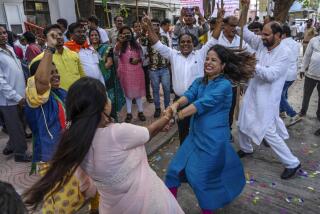Myanmar activist Suu Kyi’s party wins a historic majority in parliament
- Share via
reporting from MUMBAI, India — Myanmar opposition leader Aung San Suu Kyi’s party has won an absolute majority in the parliament, according to election results released Friday, a remarkable landslide that in effect ends five decades of military-led government.
With 95% of seats decided, Suu Kyi’s National League for Democracy had won 378 parliamentary seats as of late Friday, far more than the 329 required to control both houses of the legislature.
The scope of the party’s victory in Sunday’s election — the freest in the Southeast Asian nation since the army took power in 1962 — has surprised even the NLD’s most optimistic projections. The party has won more than 80% of the seats contested, enough to hold a majority in both houses despite one-quarter of seats being reserved for the military.
Myanmar’s military has pledged to respect the results of the election.
Controlling both houses will allow Suu Kyi’s party to select two of three candidates for president — the third coming from the military — giving the party almost certain control over the executive branch. The presidential vote will come after the new parliament meets early next year.
“If the NLD gains full control of the legislative and executive branches, the party will be able to set and execute most aspects of its policy agenda,” said Christian Lewis, an analyst with Eurasia Group, a consulting company.
Although the NLD has not released detailed policy plans — relying on the popularity of Nobel laureate Suu Kyi and widespread disenchantment with military rule — the party is likely to press for further democratic reforms to unwind what was one of the world’s most repressive dictatorships and encourage the United States to lift remaining economic sanctions.
But the army remains a powerful force, retaining control over three of the most important ministries, including defense and border affairs, as well as key industries such as mining and petroleum.
The military-written constitution bars anyone with close foreign relatives from becoming president. The clause was aimed at preventing Suu Kyi from holding the office, because her late husband was British, as are their two sons.
Suu Kyi has indicated she would try to change the law, but with its 25% bloc in the parliament the military is able to block constitutional amendments and protect its remaining authority.
“All indications show that [the military] will continue to reject any proposed constitutional changes that affect the balance of power in government,” Lewis said.
Suu Kyi was freed after more than a decade under house arrest in 2010, and the army instituted initial democratic reforms the following year, including freeing jailed dissidents and lifting some free-speech restrictions.
But decades of tight-fisted military rule have left Myanmar an economic shambles, and questions remain over the NLD’s ability to implement reforms. The party led by aging dissidents — including 70-year-old Suu Kyi — has relatively few policymakers and technocrats with government experience.
The party now must deal with the outsize expectations of its supporters as well as the country’s ethnic minorities, which have long chafed under military rule.
Although Sunday’s balloting was largely praised as free and transparent, large numbers of ethnic and religious minorities were not allowed to vote, including hundreds of thousands of Rohingya Muslims, who have been stripped of citizenship, and ethnic groups living in northern border areas where militias have been battling the army.
ALSO
Claremont McKenna dean resigns after students protest campus racial bias
Inca boy’s DNA shows how humans spread to South America
College students confront subtler forms of bias: slights and snubs
More to Read
Sign up for Essential California
The most important California stories and recommendations in your inbox every morning.
You may occasionally receive promotional content from the Los Angeles Times.











